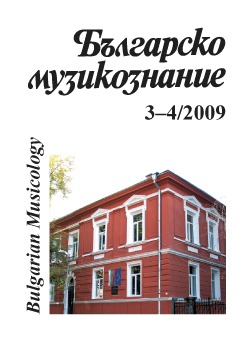Псалтиката – идеи за „транскрипция” на балканската православна музика (поствизантийски период)
The Term Psaltika – Ideas for Transcribing Balkan Orthodox Music (A Post-Byzantine Period)
Author(s): Elena TonchevaSubject(s): Music
Published by: Институт за изследване на изкуствата, Българска академия на науките
Summary/Abstract: The term psaltika appears in the first Bulgarian music-theoretical printed text during the National Revival period – in the so-called “Mirror” by Nikolai Triandafilov (1848). The term psaltika, associated with the Medieval Greek music-terminological tradition is perceived, confirmed and preserved to present day as an indication of the traditional Balkan monodic, respectively Bulgarian church singing. In this text are traced back some peculiarities of the transition from oral to written tradition in the Eastern Orthodox Balkan region. The Balkan Orthodox church singing tradition, the psaltika, remains until present day as a vibrant oral singing tradition, offering specific opportunities for studying the phenomena of transition from a written description to a written notation (transcription). It’s pointed out that in Eastern as well as in Western Europe the written music has a significant development, which historic development deserves the active attention of modern musicology. Here in is outlined an untapped until now scientific perspective – the revealing of valuable opportunities for comparative retrospective monitoring and restoration of earlier stylistic strata of Byzantine church singing – still unknown to modern cultural circles. The Eastern Europeans know very little about their musical development during the past millennium. Despite the immense difficulty, the study of this part of the European music tradition worths the effort. Enriched with specific knowledge about the phenomenon Eastern Orthodox music – knowledge very important to us, we get a chance to rediscover the authentic Orthodox ethos – as a confirmation of the truth about the individual, freedom, fellowship and love. Without this knowledge, the European history as well as the global music would remain incomplete.
Journal: Българско музикознание
- Issue Year: 2009
- Issue No: 3-4
- Page Range: 20-36
- Page Count: 17
- Language: Bulgarian
- Content File-PDF

